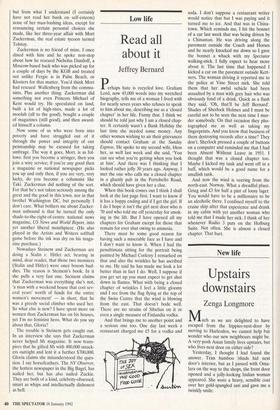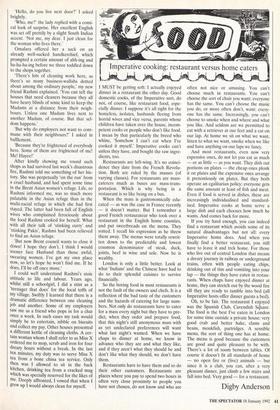New life
Upstairs downstairs
Zenga Longmore Much as we are delighted to have escaped from the hippies-next-door by moving to Harlesden, we cannot help but wonder who our new neighbours might be. A very' posh Asian family lives upstairs, but who lives next door on either side?
Yesterday, I thought I had found the answer. Trim bamboo blinds hid next door's interior, but as I passed with Oma- lara on the way to the shops, the front door opened and a jolly-looking Indian woman appeared. She wore a heavy, sensible coat over her gold-spangled sari and gave me a twinkly smile.
'Hello, do you live next door?' I asked brightly.
`Who, me?' the lady replied with a comi- cal look of surprise. Her excellent English was set off prettily by a slight South Indian accent. 'Not me, my dear. I just clean for the woman who lives there.'
Omalara offered her a suck on an already well-sucked handkerchief, which prompted a certain amount of ahh-ing and ha-ha-ha-ing before we three toddled down to the shops together.
`There's lots of cleaning work here, as there's so many business-wallahs dotted about among the ordinary people,' my new friend Rashmi explained. 'You can tell the houses that need cleaners because they all
have heavy blinds of some kind to keep the Madams at a distance from their neigh- bours. Unless one Madam lives next to another Madam, of course. But that sel- dom happens.'
`But why do employers not want to com- mune with their neighbours?' I asked in bafflement.
`Because they're frightened of everybody here. Some of them are frightened of me! Me! Hayee!'
After kindly showing me round such shops as had survived last week's disastrous fire, Rashmi told me something of her his- tory. She was perpetually 'on the run' from a cruel husband, and had spent some time in the Brent Asian women's refuge. Life, so Rashmi informed me, was so much more palatable in the Asian refuge than in the multi-racial refuge in which she had first stayed. The latter had been full of English wives who complained ferociously about the food Rashmi cooked for herself. What with all their talk of 'stinking curry' and `stinking Pakis', Rashmi had been relieved to find an Asian refuge.
'But now Brent council wants to close it down! I hope they don't. I think I would
sooner face Husband than those awful, swearing women. I've got my own place now, so let's hope he won't find me. If he does, I'll be off once more.'
I could well understand Rashmi's stoic attitude to life and labour. Years ago, whilst still a schoolgirl, I did a stint as a `teenager that does' for the local toffs of my village. Swiftly I learned that there is a dramatic difference between one cleaning job and another. Some of my employers saw me as a friend who pops in for a chat once a week. In such cases my task would simply be to entertain, nibble on biscuits and collect my pay. Other houses presented a different kettle of cleaning cloths. A cer- tain woman whom I shall refer to as Miss X ordered me to mop, scrub and iron for four dreary hours without a break. In the last ten minutes, my duty was to serve Miss X tea from a bone china tea service. Only then was I allowed to sit in the back kitchen, drinking tea from a cracked mug which was specially reserved for the likes of me. Deeply affronted, I vowed that when I grew up I would always clean for myself.



















































 Previous page
Previous page